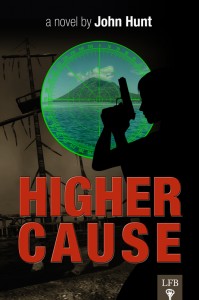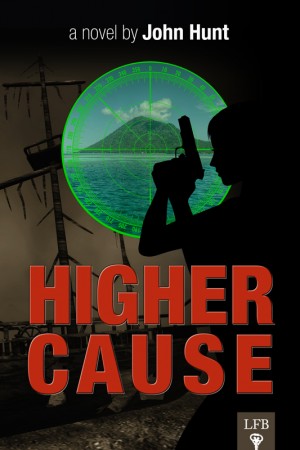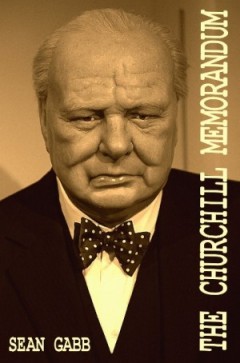
This review is part of a series covering each installment of the serialized novel Higher Cause, written by John Hunt and published by Laissez Faire Books. To catch up, start with the announcement, the book’s link-rich table of contents, and the first review.

We start out the second half of the book with two more chapters. Hunt is starting to benefit from the seeds planted in earlier chapters. There is a lot going on, a lot of side plots and characters to worry about, and as each advances, they give us that mild euphoria that comes from a new development or a new clue revealed. With so much to work with, these developments and clues come tumbling out of the prose at us.
The first chapter begins with some medical care for Jeff Baddori. It catches us up to date with Dr. Thomas Standall, whom we met earlier. The research done into the wounds that Jeff and Petur received adds a lot to the narrative. It also allows for some pro-market explanations. I would have omitted the first three paragraphs and had the information therein come out as dialogue though.
The second part of the first chapter is a bracing search for the bad guys. This time, something is found. It’s a stimulating little stretch of prose and leaves us with the certainty of trouble ahead.
The second chapter deals with Onbacher’s theories about the Bounty. He has made some progress in his own search, which he confesses was, initially, his principle interest in The Island. The novel has a lot of appealing aspects, and this is one of the main ones. It takes a historical fact, fills in a lot of gaps with some real imagination and then connects it all to the present narrative, which does not have to have anything to do with it. It could survive quite well on its own, but the addition of the historical fiction enriches the tale.
[continue reading…]
Help Promote Prometheus Unbound by Sharing this Post

I recently read The Churchill Memorandum, by English libertarian Sean Gabb. I devoured most of it on a transatlantic flight, and finished the last bit on terra firma. I tend to like thrillers (some favorite authors include Nelson DeMille and, of late, Cherie Priest, author of Bloodshot); alternate history (e.g., Harry Turtledove, Brad Linaweaver’s Moon of Ice, L. Neil Smith’s The Probability Broach); and books with libertarian themes or influences (L. Neil Smith, Ayn Rand, Henry Hazlitt, Brad Linaweaver, Victor Koman, J. Neil Schulman). So it’s no surprise I enjoyed The Churchill Memorandum, which is very well written and which combines all three features (full disclosure: Gabb is a friend).
The novel is set in 1959, in an alternate history in which Hitler died in a car accident in 1939, thus averting WWII and changing the course of history. Gabb’s libertarian influences — he’s the head of the UK Libertarian Alliance — as well as his deep historical knowledge, are evident throughout the book. The novel depicts amazing technological progress — some of it rivaling or exceeding 2011 levels — in 1959, since WWII did not occur to sap away the economic strength and entrepreneurial innovations of tens of millions of individuals who would otherwise have been eviscerated in state war. So in 1959 there are magnetic bullet trains, home energy generators, and many other seemingly fantastic innovations.
The story follows the adventures of one Anthony Markham, a Churchill historian who, on a trip to the now-fascist police-state and isolationist America to research the Churchill archives at Harvard, stumbles across an explosive document that purports to document secret pacts that changed the course of American and world history. This leads to an intriguing geopolitical thriller informed by the author’s libertarian views. It is told in first person point of view (POV), my personal favorite for thrillers (and other novels) since it forces the narrator to show not tell, and not to omnisciently cheat and reveal details the protagonist would not know. Gabb’s ambivalent and somewhat bipolar English attitude towards America — at once a great power and friend of England, and a schizophrenic and dangerous destroyer of the ancient European order and institutions — is present throughout; and as a skeptic of the American mythos myself, I really enjoyed this foreign perspective. (Gabb recently presented a talk on “The Case Against the American War of Independence.”)
[continue reading…]
Help Promote Prometheus Unbound by Sharing this Post











